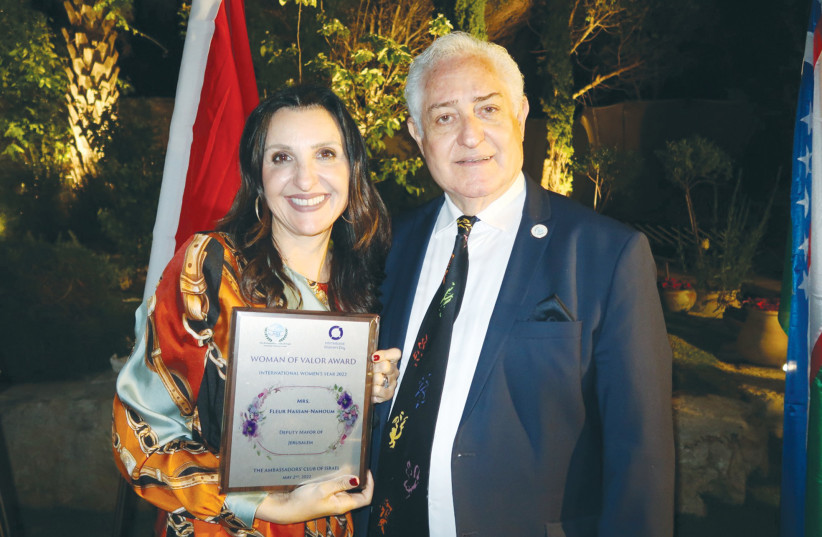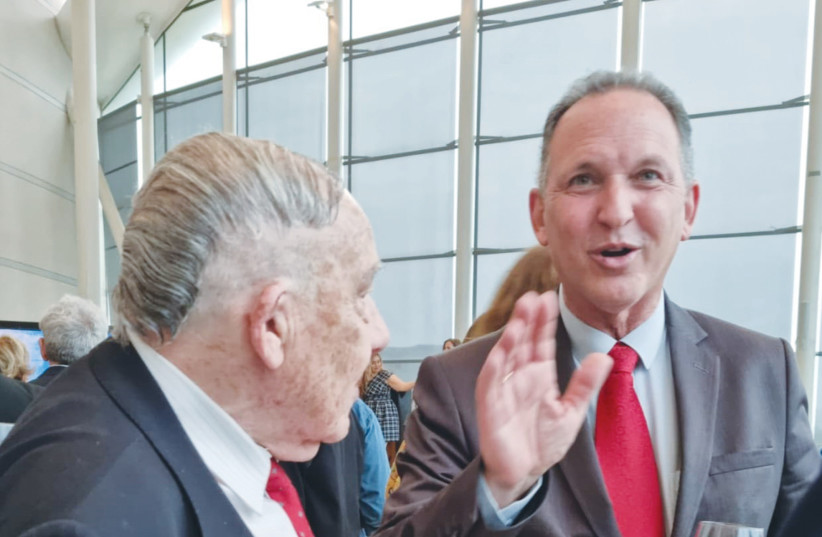■ ECUADOR’S AMBASSADOR to Israel Helen Sophie Deller Klein, who was one of several female ambassadors to receive the Woman of Valor award from the Ambassadors’ Club of Israel on Monday, actually had her mind on other things. Her president, Guillermo Lasso, is due to arrive in Israel on Monday of next week, and will inaugurate Ecuador’s Innovation Office in Jerusalem during his visit. The Latin American presence in the capital is growing slowly but surely.
The Woman of Valor ceremony, which was scheduled to take place on International Women’s Day, was twice postponed, and ACI President Yitzhak Eldan decided that he would not give in to further delays.
The event took place at the elegant, palatial Kfar Shmaryahu residence of art historian, gemologist, diamond dealer, author, philanthropist and hospitable hostess Olessia Kantor. The ambassadors who were honored represent Bulgaria, Colombia, Costa Rica, Cyprus, Ecuador, El Salvador, Guatemala, Germany (in absentia), Lithuania, Malta, Slovenia, Thailand and Uzbekistan. As Kosovo does not have an ambassador but has an embassy in Jerusalem, it was also decided to honor Kosovo’s charge d’affaires, Ines Demiri.
There are currently other countries with female ambassadors in Israel, as there has been in the past. Among them are Australia, Austria, Canada, Finland, France, Kazakhstan, Latvia, Moldova, Nepal, Philippines, Poland and Romania, – and that’s just a short list.
Two of the current ambassadors, Susana Gun de Hassenson of El Salvador and Malta’s Cecilia Attard Pirotta were honored for the second time. Each had previously served as ambassador to Israel, and after a hiatus were appointed once again.

De Hassenson, in a brief address, noted that the definition of Woman of Valor is detailed in a 22 line poem in the Book of Proverbs in which the worth of a woman is determined by her domestic capabilities. Today’s women of valor she said, choose their own worth, and some become diplomats – though not enough, she underscored, pointing out that 79.3% of the world’s diplomats are men.
One of those male ambassadors, Martin Mwanambale, who is Ambassador of Zambia and Dean of the Diplomatic Corps, made the point that women who suffered discrimination in the past are now being recognized for their achievements.
The occasion was also used to recognize three Israeli women: Kantor; Noy Hadas, who created a direct chain between farmers and consumers and urged everyone present to buy locally grown fruits and vegetables; and Fleur Hasson-Nahoum, the ever-energetic deputy mayor of Jerusalem, who quipped that Eldan organizes so many events in order to have an excuse to be kissed by each of the women honored.
Hasson-Nahoum credited him with turning the diplomatic corps into a community and spoke of the need to have an equal number of women representatives in decision making processes. “Women are good peace builders and bridge builders,” she said, adding that “the qualities of women are diplomatic qualities by nature.”
She was proud that women had been given the vote at the First Zionist Congress, long before the State of Israel was established. Then, remembering her own status in local politics, the deputy mayor invited everyone present to come to spend a day with her in Jerusalem so that she could show them what the city is doing for its Jewish, Arab and Christian populations.
Foreign Ministry Chief of Protocol Gil Haskel – who arrived late, having come from the Polish Constitution Day reception where he had to fill in for Minister Orit Farkash-Hacohen who had fallen ill the previous day – said that it was difficult to speak about women ambassadors without being politically incorrect. But he was happy to see so many who are all competent diplomats and who done some wonders for their countries.
On a personal level, Haskel said that he did not differentiate between male and female ambassadors. “We’re all equal,” he said. Haskel was previously head of Mashav, the Ministry of Foreign Affairs Agency for International Development Cooperation. Mashav did a lot for gender equality and women’s empowerment, he said.
Both before and after the ceremony, guests thronged around a display case of exquisite luxury jewelry from Tzoffey’s, which has been in business since 1818. President Avner Sofiov, looking like a 19th century nobleman, was happy to explain each piece, and graciously posed for photos in response to many requests, while his sons smilingly minded the store.
■ IN THE absence of an ambassador, Polish Charge d’affaires Agata Czaplinska together with Defense, Military, Naval and Air attache Col.Andrzej Stanek, hosted Poland’s Constitution Day marking the anniversary of the constitution’s declaration on May 3, 1791. It was Europe’s first constitution, and the world’s second after that of the United States. There was a lot of history at the event, which was held at the Rabin Center in Tel Aviv.
Among the guests was Stanislaw Aronson, a former resistance fighter, survivor of the Warsaw Ghetto and a lieutenant colonel in the Polish Home Army who celebrates his 97th birthday today.
Aronson fought in the Polish Uprising of 1944. During the liquidation of the Warsaw Ghetto, his family was deported to Auschwitz. He managed to jump off the train, and never saw his family again. A farmer gave him food and shelter and later transported him to the railroad station so that he could return to Warsaw where he contacted non-Jewish friends who found a hiding place for him.
Soon after, he was contacted by the Home Army and asked to join in the resistance effort, which he did willingly. He was wounded, placed in a field hospital from which he ran away and rejoined the army. After the Red Army entered Poland, Aronson was arrested, but once again succeeded in escaping and secretly leaving the country.
He later joined Anders Army, but after being contacted by an uncle living in Tel Aviv, who persuaded him to come to pre-state Israel, he settled in Jerusalem. He began to study medicine, but his studies were interrupted when he had to fight again in the War of Independence.
Another veteran of the War of Independence was Polish born Ambassador Mordechai Palzur, who was the first Israeli ambassador to return to Poland after diplomatic relations that had been severed in 1973 were renewed in February 1990. Palzur, who has served as ambassador in several other countries and subsequently became chief of protocol, got together with current Chief of Protocol Gil Haskel.
Another Polish-born ambassador to Poland who was seen at the reception was Zvi Ravner. Also present was Zvi Magen, former deputy head of Nativ, the Israeli government’s liaison bureau with Jews living in Eastern Bloc countries, and ambassador to Russia and Ukraine.
During the formal part of the evening, Czaplinska called for a moment of silence in tribute to the Ukrainian victims of Russian aggression, and said that Russia is acting with blatant disregard for international law.
Haskel chose to take the traditional path at such affairs and to concentrate on the bilateral relationship between Israel and Poland. It was no secret, he said, that Jerusalem and Warsaw are going through challenging times in their relations, but he was confident “that we will overcome.” He reminded his audience that a thousand years of Jewish history in Poland was shattered during the Holocaust, but that since the revival of diplomatic relations, there have been and are many areas of cooperation and shared values.
Lithuanian Ambassador Lina Antanaviciene, whose country like Poland sympathizes and empathizes with Ukraine and is highly critical of Russia, joined Czaplinska ,Stanek and Haskel on stage for the toasts to Poland and Israel.
■ SIBLINGS SELDOM take the same path in life. Even identical twins often choose different careers, like different foods, and are not necessarily partial to the same colors, books or movies. So no one should be surprised that Sir Stuart Montagu Samuel, the brother of Herbert Samuel, has been all but forgotten, despite the fact that he was MP for Whitechapel and president of the British Board of Deputies.
To enlighten those readers who may think that Herbert Samuel is just the name of a hotel, he was the British High Commissioner of what was then Palestine, appointed 105 years ago, in 1917. But before that he was the first practicing Jew to serve as a cabinet minister and to lead a major British political party. (Let’s not forget that Benjamin Disraeli, though born Jewish, had been converted to Christianity as a child).

Influenced by Chaim Weizmann, who was later to become Israel’s first president, Herbert Samuel was also a Zionist – hardly an attribute for a British High Commissioner in this part of the world. In a sense, the two brothers did pick similar careers, but not always going in the same direction. Herbert Samuel’s son and grandson were born in pre-state Israel. The role he held, at the time that he held it, gave him a prominent place in history – but that may not be the reason that he is so much better known than his brother.
Dr. Gabriel Sivan, chairman of the Israel branch of the Jewish Historical Society of England, will shed some light on the subject at a Zoom meeting on Monday, March 9, at 7.30 p.m. (5.30 GMT). The meeting ID is 810 8543 1790 and the Passcode is 668 272.
